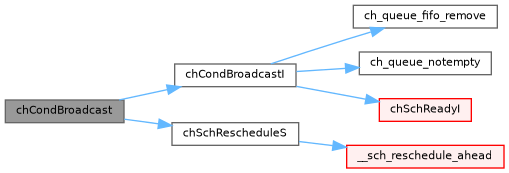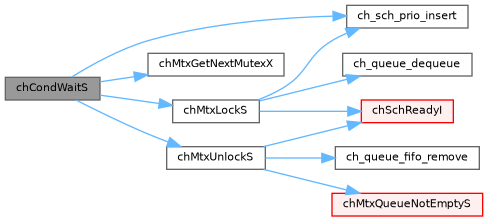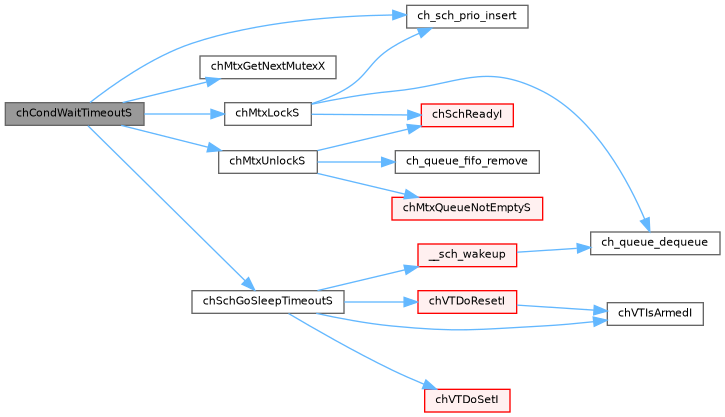Detailed Description
This module implements the Condition Variables mechanism. Condition variables are an extensions to the mutex subsystem and cannot work alone.
Operation mode
The condition variable is a synchronization object meant to be used inside a zone protected by a mutex. Mutexes and condition variables together can implement a Monitor construct.
- Precondition
- In order to use the condition variable APIs the
CH_CFG_USE_CONDVARSoption must be enabled inchconf.h.

Data Structures | |
| struct | condition_variable |
| condition_variable_t structure. More... | |
Macros | |
| #define | __CONDVAR_DATA(name) |
| Data part of a static condition variable initializer. | |
| #define | CONDVAR_DECL(name) |
| Static condition variable initializer. | |
Typedefs | |
| typedef struct condition_variable | condition_variable_t |
| condition_variable_t structure. | |
Functions | |
| void | chCondObjectInit (condition_variable_t *cp) |
Initializes s condition_variable_t structure. | |
| void | chCondSignal (condition_variable_t *cp) |
| Signals one thread that is waiting on the condition variable. | |
| void | chCondSignalI (condition_variable_t *cp) |
| Signals one thread that is waiting on the condition variable. | |
| void | chCondBroadcast (condition_variable_t *cp) |
| Signals all threads that are waiting on the condition variable. | |
| void | chCondBroadcastI (condition_variable_t *cp) |
| Signals all threads that are waiting on the condition variable. | |
| msg_t | chCondWait (condition_variable_t *cp) |
| Waits on the condition variable releasing the mutex lock. | |
| msg_t | chCondWaitS (condition_variable_t *cp) |
| Waits on the condition variable releasing the mutex lock. | |
| msg_t | chCondWaitTimeout (condition_variable_t *cp, sysinterval_t timeout) |
| Waits on the condition variable releasing the mutex lock. | |
| msg_t | chCondWaitTimeoutS (condition_variable_t *cp, sysinterval_t timeout) |
| Waits on the condition variable releasing the mutex lock. | |
Macro Definition Documentation
◆ __CONDVAR_DATA
| #define __CONDVAR_DATA | ( | name | ) |
Data part of a static condition variable initializer.
This macro should be used when statically initializing a condition variable that is part of a bigger structure.
- Parameters
-
[in] name the name of the condition variable
◆ CONDVAR_DECL
| #define CONDVAR_DECL | ( | name | ) |
Static condition variable initializer.
Statically initialized condition variables require no explicit initialization using chCondInit().
- Parameters
-
[in] name the name of the condition variable
Typedef Documentation
◆ condition_variable_t
| typedef struct condition_variable condition_variable_t |
condition_variable_t structure.
Function Documentation
◆ chCondObjectInit()
| void chCondObjectInit | ( | condition_variable_t * | cp | ) |
Initializes s condition_variable_t structure.
- Parameters
-
[out] cp pointer to a condition_variable_tstructure
- Function Class:
- Object or module nitializer function.
Definition at line 75 of file chcond.c.
References ch_queue_init(), chDbgCheck, and condition_variable::queue.

◆ chCondSignal()
| void chCondSignal | ( | condition_variable_t * | cp | ) |
Signals one thread that is waiting on the condition variable.
- Parameters
-
[in] cp pointer to the condition_variable_tstructure
- Function Class:
- Normal API, this function can be invoked by regular system threads but not from within a lock zone.
Definition at line 89 of file chcond.c.
References ch_queue_fifo_remove(), ch_queue_notempty(), chDbgCheck, chSchWakeupS, chSysLock, chSysUnlock, MSG_OK, condition_variable::queue, and threadref.

◆ chCondSignalI()
| void chCondSignalI | ( | condition_variable_t * | cp | ) |
Signals one thread that is waiting on the condition variable.
- Postcondition
- This function does not reschedule so a call to a rescheduling function must be performed before unlocking the kernel. Note that interrupt handlers always reschedule on exit so an explicit reschedule must not be performed in ISRs.
- Parameters
-
[in] cp pointer to the condition_variable_tstructure
- Function Class:
- This is an I-Class API, this function can be invoked from within a system lock zone by both threads and interrupt handlers.
Definition at line 111 of file chcond.c.
References ch_queue_fifo_remove(), ch_queue_notempty(), chDbgCheck, chDbgCheckClassI, chSchReadyI(), MSG_OK, condition_variable::queue, ch_thread::rdymsg, threadref, and ch_thread::u.

◆ chCondBroadcast()
| void chCondBroadcast | ( | condition_variable_t * | cp | ) |
Signals all threads that are waiting on the condition variable.
- Parameters
-
[in] cp pointer to the condition_variable_tstructure
- Function Class:
- Normal API, this function can be invoked by regular system threads but not from within a lock zone.
Definition at line 130 of file chcond.c.
References chCondBroadcastI(), chSchRescheduleS(), chSysLock, and chSysUnlock.

◆ chCondBroadcastI()
| void chCondBroadcastI | ( | condition_variable_t * | cp | ) |
Signals all threads that are waiting on the condition variable.
- Postcondition
- This function does not reschedule so a call to a rescheduling function must be performed before unlocking the kernel. Note that interrupt handlers always reschedule on exit so an explicit reschedule must not be performed in ISRs.
- Parameters
-
[in] cp pointer to the condition_variable_tstructure
- Function Class:
- This is an I-Class API, this function can be invoked from within a system lock zone by both threads and interrupt handlers.
Definition at line 149 of file chcond.c.
References ch_queue_fifo_remove(), ch_queue_notempty(), chDbgCheck, chDbgCheckClassI, chSchReadyI(), MSG_RESET, condition_variable::queue, ch_thread::rdymsg, threadref, and ch_thread::u.
Referenced by chCondBroadcast().

◆ chCondWait()
| msg_t chCondWait | ( | condition_variable_t * | cp | ) |
Waits on the condition variable releasing the mutex lock.
Releases the currently owned mutex, waits on the condition variable, and finally acquires the mutex again. All the sequence is performed atomically.
- Precondition
- The invoking thread must have at least one owned mutex.
- Parameters
-
[in] cp pointer to the condition_variable_tstructure
- Returns
- A message specifying how the invoking thread has been released from the condition variable.
- Return values
-
MSG_OK if the condition variable has been signaled using chCondSignal().MSG_RESET if the condition variable has been signaled using chCondBroadcast().
- Function Class:
- Normal API, this function can be invoked by regular system threads but not from within a lock zone.
Definition at line 179 of file chcond.c.
References chCondWaitS(), chSysLock, and chSysUnlock.

◆ chCondWaitS()
| msg_t chCondWaitS | ( | condition_variable_t * | cp | ) |
Waits on the condition variable releasing the mutex lock.
Releases the currently owned mutex, waits on the condition variable, and finally acquires the mutex again. All the sequence is performed atomically.
- Precondition
- The invoking thread must have at least one owned mutex.
- Parameters
-
[in] cp pointer to the condition_variable_tstructure
- Returns
- A message specifying how the invoking thread has been released from the condition variable.
- Return values
-
MSG_OK if the condition variable has been signaled using chCondSignal().MSG_RESET if the condition variable has been signaled using chCondBroadcast().
- Function Class:
- This is an S-Class API, this function can be invoked from within a system lock zone by threads only.
Definition at line 205 of file chcond.c.
References ch_sch_prio_insert(), CH_STATE_WTCOND, chDbgAssert, chDbgCheck, chDbgCheckClassS, chMtxGetNextMutexX(), chMtxLockS(), chMtxUnlockS(), chSchGoSleepS, chThdGetSelfX, ch_thread::hdr, ch_thread::queue, condition_variable::queue, ch_thread::rdymsg, ch_thread::u, and ch_thread::wtobjp.
Referenced by chCondWait().

◆ chCondWaitTimeout()
| msg_t chCondWaitTimeout | ( | condition_variable_t * | cp, |
| sysinterval_t | timeout ) |
Waits on the condition variable releasing the mutex lock.
Releases the currently owned mutex, waits on the condition variable, and finally acquires the mutex again. All the sequence is performed atomically.
- Precondition
- The invoking thread must have at least one owned mutex.
-
The configuration option
CH_CFG_USE_CONDVARS_TIMEOUTmust be enabled in order to use this function.
- Postcondition
- Exiting the function because a timeout does not re-acquire the mutex, the mutex ownership is lost.
- Parameters
-
[in] cp pointer to the condition_variable_tstructure[in] timeout the number of ticks before the operation timeouts, the special values are handled as follow: - TIME_INFINITE no timeout.
- TIME_IMMEDIATE this value is not allowed.
- Returns
- A message specifying how the invoking thread has been released from the condition variable.
- Return values
-
MSG_OK if the condition variable has been signaled using chCondSignal().MSG_RESET if the condition variable has been signaled using chCondBroadcast().MSG_TIMEOUT if the condition variable has not been signaled within the specified timeout.
- Function Class:
- Normal API, this function can be invoked by regular system threads but not from within a lock zone.
Definition at line 257 of file chcond.c.
References chCondWaitTimeoutS(), chSysLock, and chSysUnlock.

◆ chCondWaitTimeoutS()
| msg_t chCondWaitTimeoutS | ( | condition_variable_t * | cp, |
| sysinterval_t | timeout ) |
Waits on the condition variable releasing the mutex lock.
Releases the currently owned mutex, waits on the condition variable, and finally acquires the mutex again. All the sequence is performed atomically.
- Precondition
- The invoking thread must have at least one owned mutex.
-
The configuration option
CH_CFG_USE_CONDVARS_TIMEOUTmust be enabled in order to use this function.
- Postcondition
- Exiting the function because a timeout does not re-acquire the mutex, the mutex ownership is lost.
- Parameters
-
[in] cp pointer to the condition_variable_tstructure[in] timeout the number of ticks before the operation timeouts, the special values are handled as follow: - TIME_INFINITE no timeout.
- TIME_IMMEDIATE this value is not allowed.
- Returns
- A message specifying how the invoking thread has been released from the condition variable.
- Return values
-
MSG_OK if the condition variable has been signaled using chCondSignal().MSG_RESET if the condition variable has been signaled using chCondBroadcast().MSG_TIMEOUT if the condition variable has not been signaled within the specified timeout.
- Function Class:
- This is an S-Class API, this function can be invoked from within a system lock zone by threads only.
Definition at line 295 of file chcond.c.
References ch_sch_prio_insert(), CH_STATE_WTCOND, chDbgAssert, chDbgCheck, chDbgCheckClassS, chMtxGetNextMutexX(), chMtxLockS(), chMtxUnlockS(), chSchGoSleepTimeoutS(), chThdGetSelfX, ch_thread::hdr, MSG_TIMEOUT, ch_thread::queue, condition_variable::queue, TIME_IMMEDIATE, ch_thread::u, and ch_thread::wtobjp.
Referenced by chCondWaitTimeout().
